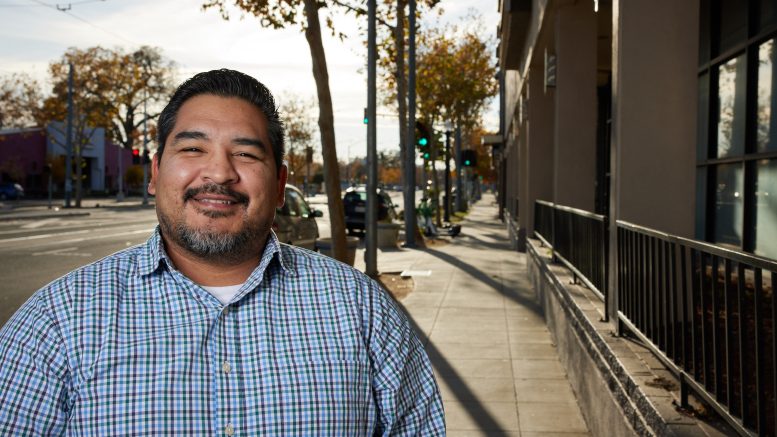By Dakota Morlan
Daniel Savala is a lifelong Sacramentan who joined the Del Paso Boulevard Partnership as its executive director in 2021. The property and business improvement district works to strengthen the retail corridor of this part of North Sacramento.
Savala is a big proponent of increased housing density in his community, which he pinpoints as “the most important thing for the long-term success of Del Paso Boulevard.” He sees affordable housing as about helping everyday working folks who struggle to even pay rent in Sacramento’s changing market.
We spoke with Savala about how housing and economic development go hand-in-hand.
What is unique about the Del Paso Boulevard area when it comes to housing?
North Sacramento, where [Del Paso Boulevard] is located, is an historically underserved neighborhood. … With that comes a history of depression. … Del Paso Boulevard is one of those old commercial retail corridors. … It’s really walkable, and it’s adjacent to a single-family residential neighborhood.
The residential portions of Del Paso Boulevard and North Sacramento are low-income. There aren’t enough people who live in the area to sustain and support the businesses. … So that, over 10, 15, 20 years, has created a bunch of vacant storefronts. Folks don’t have disposable incomes to be spending at these shops. Housing and people is the No. 1 thing that we feel is going to help change the tide for the business corridor, and the affordable housing piece is such a huge part of it.
Another unique thing about Del Paso Boulevard is it sits right along three major light rail stations [surrounded by vacant land], and in California and Sacramento, with a desire to reduce greenhouse gas emissions and to be more sustainable, we want to build dense housing near light rail platforms. And so when you do that, you’re looking at [the] government granting tax credits for what’s known as transit-oriented development. With those comes a mandate for affordability, which is a good thing. We feel that people who live and work along Del Paso Boulevard — people who work in downtown’s core, the hotel workers, the food and beverage industry workers — those folks should all have an affordable place to live, and if it could be Del Paso Boulevard, that would be an even bigger win.
What do you see as the major factors driving the housing crisis in the Sacramento region?
Two things. One is obviously outside incomes, like from folks from the Bay Area. I think telecommuting and remote working is having a bigger impact. … When the demand goes up and people can afford these ridiculous rents, you’re pricing out a lot of lifelong Sacramentans.
What’s slowing down the supply is — I’m sorry to say — California and its regulation and everything that comes along with it. It takes too long, and it’s far too expensive to build housing right now, even affordable housing. The last project I followed in Sacramento that was an affordable housing development was at $600,000 per unit. … That’s a problem, and how do you address that?
What do you see as the most critical responses to lack of affordable housing? Also, what can you tell us about these responses and why they offer the most potential to solve the problem of housing affordability?
I think the financing side plays a big role. I’m not an expert in construction finance, but I know it’s really hard to get loans. … A lot of projects that get state or federal assistance or subsidies require project labor agreements that also have an impact on what the overall cost is.
We have these really great ideas on the planning side and the state side. … The state essentially said any person in California can build up to 1,200 square-feet of an additional housing unit [accessory dwelling unit] on their property by right, so long as it meets a certain criteria. … It’s a great idea because it’s supposed to speed up the housing supply.
[Regarding the homelessness crisis], about a year ago, the City of Sacramento was slated to open up a tent city/safe parking zone here, down the street from where I live. … The city pulled the plug on it because it was going to be too expensive. … Well, three months later, the homeless individuals took over the site and have a successful camp going right now, and it cost them nothing. Whether you like it or not, the tent city exists. It’s there, it’s managed and it’s working. … Think how crazy that is. We can’t even get a parking lot set up for safe parking in one year, let alone build housing.
What evidence exists to show the effectiveness of these strategies?
We have an affordable housing development right now [127 income-based units on Arden Way] that’s just about to finish up. … It used to be an old, vacant lumberjack facility that was just an eyesore. [This] has already had an economic impact, just from the construction workers that have been here patronizing the local businesses and filling up on gas. … Now, when those people get to move in and live there, you have an additional set of customers that’s going to help the retail business area and give people a chance to find some breathing room for their situation.
What limitations around these strategies exist?
There’s a huge attitudinal barrier. As soon as you use the word “affordable” housing, people mix it up with low-income housing or poor quality housing or individuals who have no money. And people have to recognize that over the last 30 years, California and cities throughout California have really changed the way they build affordable housing. It’s not the old tenement-style housing where you build a project-type environment, and everyone’s there on a subsidized voucher. It doesn’t work that way. [Yet] you can’t even begin to have a conversation about affordable housing because you get this NIMBYism that kicks in, which is really just a lack of understanding about what’s being proposed to be built.
Have you encountered people who say they support affordable housing yet still have a NIMBY mentality?
Thankfully, California is a really progressive state and even our city … is one of the first prohousing designated cities. That represents a whole host of new laws that basically says you cannot discriminate. You have to build affordable housing. NIMBYism is almost outlawed to some degree. If you’re not meeting your reasonable housing allocation needs as a city, then you don’t have a say anymore. You have to build the housing.
As a third-generation resident of Sacramento, how have you seen the city change during your lifetime in terms of accessibility?
It’s horrible. My mom was a single mother who raised three children working at a local law school. [If] she had to raise us today, we would probably be living in a van or a garage because you simply can’t afford to live in Sacramento. A two-bedroom apartment or house right now in North Sacramento is costing you almost $2,000 a month, and they want you to make three times the income just to put an application in, with a credit score about 700. … What are you supposed to do?
This Q&A has been edited for length and clarity.
This story is part of the Solving Sacramento journalism collaborative. In 2023, we are focusing on finding solutions to the lack of affordable housing in the Sacramento region. Solving Sacramento is a project of the Local Media Foundation with support from the Solutions Journalism Network. Our partners include California Groundbreakers, Capital Public Radio, Outword, Russian America Media, Sacramento Business Journal, Sacramento News & Review, Sacramento Observer and Univision 19.



this article didn’t relate to closure due to covid… many business stayed open until they were forced to shut down. The upswing of the pot business which was a wrong move for our area bring more disruption.